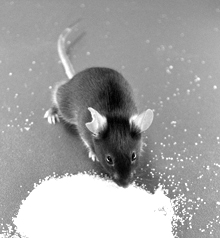Rats reveal addicted DNA
 A new report adds to the growing suggestion that drug addiction can be inherited.
A new report adds to the growing suggestion that drug addiction can be inherited.
In rats, the susceptibility of male offspring to develop addiction-like behaviour towards cocaine is correlated with the father’s level of motivation to seek cocaine, according to findings published this week in Nature Communications.
The study indicates that drug-seeking behaviour is associated with epigenetics - structural DNA methylation changes - which may contribute to the heritability of drug addiction tendencies.
Researchers separated male rats into groups that had high or low cocaine-seeking motivation on a behavioural task, and found that level of motivation to self-administer cocaine seemed to determine the motivation to seek cocaine in male offspring.
For the group of animals that showed a low level of motivation to seek cocaine, the effect on offspring is protective (conferring resistance against a high motivation to seek cocaine), consistent with previous studies.
For the males showing high motivation to seek cocaine, this high motivation or reduced resistance to drug addiction is observed in their offspring.
Differences in sites of DNA methylation, a form of epigenetic regulation of gene expression, were identified in sperm from high and low motivated male rats. Some of these differences were maintained in the sperm of the offspring.
Gene expression analysis of the nucleus accumbens, part of the reward circuitry in the brain, identified genes that are differentially expressed between offspring of high and low motivated rats and consistent with the DNA methylation patterns seen in sperm.








 Print
Print